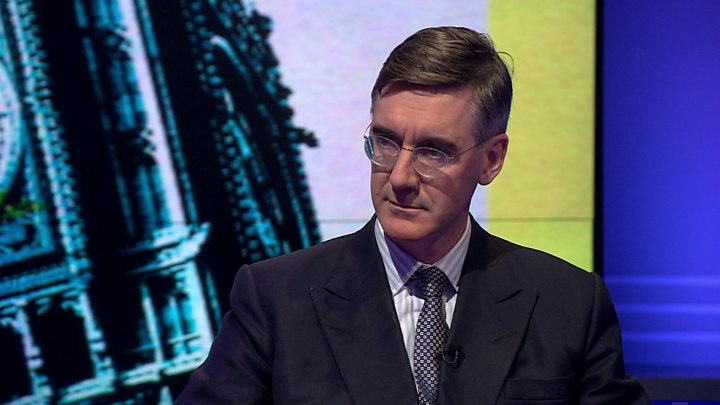Brexit: Conservative anger at Philip Hammond’s ‘dodgy project fear’

Media playback is unsupported on your device
Brexiteers have attacked Philip Hammond for reiterating a warning that a “no-deal” Brexit could damage the economy.
The chancellor’s warning was published in a letter, hours after the government laid out plans for a “no-deal” Brexit.
Conservative MP Marcus Fysh accused Mr Hammond of embarking on “another instalment of dodgy project fear”.
Meanwhile, the World Trade Organization head has told the BBC no deal “would not be the end of the world… but it’s not going to be a walk in the park”.
In a letter published on the Treasury website, Mr Hammond repeated the findings of the Treasury’s provisional Brexit analysis released earlier this year.
- What do the Brexit ‘no deal’ papers reveal?
- Reality Check: What would ‘no deal’ look like?
That analysis includes a warning that a “no-deal” Brexit could mean a 7.7% hit to GDP over the next 15 years, compared with the “status quo baseline”.
Writing to Nicky Morgan, chairwoman of the treasury committee, he said that under a “no-deal” scenario chemicals, food and drink, clothing, manufacturing, cars and retail would be the sectors “most affected negatively in the long run”.
He added that the largest negative impacts would be felt “in the north-east [of England] and Northern Ireland”.
The letter also said Treasury analysis estimated borrowing would be around £80bn a year higher under a “no-deal” scenario by 2033.
Mr Hammond added that this analysis was now “undergoing a process of refinement” and emphasised that a “no-deal” Brexit was not the government’s preferred option and that it was “confident of a agreeing a good deal”.
How a no-deal Brexit could affect Britain, according to the government’s advice
The timing of the letter was criticised, coming so soon after Brexit Secretary Dominic Raab sought to play down the risk of no deal – describing the impact as a “potential short-term disruption”.
Prominent Brexiteer Jacob Rees-Mogg, who has written to all Tory local associations urging them to reject the PM’s Chequers deal, said leaving on WTO terms was not “as absurdly frightening as the chancellor of the exchequer thinks it may be”.
“As a dog returneth to his vomit, so a fool returneth to his folly,” he said.
“The naysayers in the Treasury have consistently wanted to paint a bleak picture because they are frightened of taking responsibility for managing the economy without the crutch of the EU. It is a sign of their weakness.
“What Mr Hammond is doing is a reminder of why no-one believes the politicised forecasts of the Treasury. The Treasury is desperate to stop Brexit. Everything the Treasury does has to be read in this light.”
‘Nothing new’
But Tory MP Sarah Wollaston, who backs a new referendum on the outcome of the Brexit negotiations, said Mr Hammond’s comments were timely and they complemented, rather than contradicted, the no-deal analysis.
She told BBC Radio 4’s Today that Mr Rees-Mogg, who chairs the European Research Group (ERG) of Tory MPs, held too much sway in the party and the “ERG tail is wagging the Conservative dog”.
Cabinet Office minister David Lidington said there was “nothing new” in the chancellor’s comments, telling Today that it was “clear” that leaving the EU without an agreement was “not a desirable outcome”.
Asked whether he agreed with his colleague Liam Fox, who claimed earlier this month the odds were 60:40 in favour of a “no-deal” exit, Mr Lidington said he was not a betting man but the odds of a deal were “good”.
“We have to do the emergency ‘no-deal’ planning but it is not in our interests we end up in that position.”
Shadow Brexit secretary Sir Keir Starmer said: “A ‘no-deal’ Brexit has never been viable and would represent a complete failure of the government’s negotiating strategy.”
Roberto Azevedo, the director-general of the WTO, said there would be an impact from a “no-deal” Brexit, with the possibility of trade “barriers” at the borders and tariffs between the UK and the EU almost certain.
“The EU cannot discriminate amongst the WTO members, so the UK will have to be treated as all the other members, and the other members pay tariffs so the UK will have to pay tariffs as well,” he said.
He was also asked whether the UK could unilaterally remove its trade tariffs.
“Technically, yes,” he replied. “But not only to the EU, to everybody, so you cannot pick and choose to whom you lower your tariffs.
“If you decide that a particular product, let’s say glasses, that they go down to zero, that’s perfectly right, any member of the WTO can do that. But that zero applies to everyone else.”


